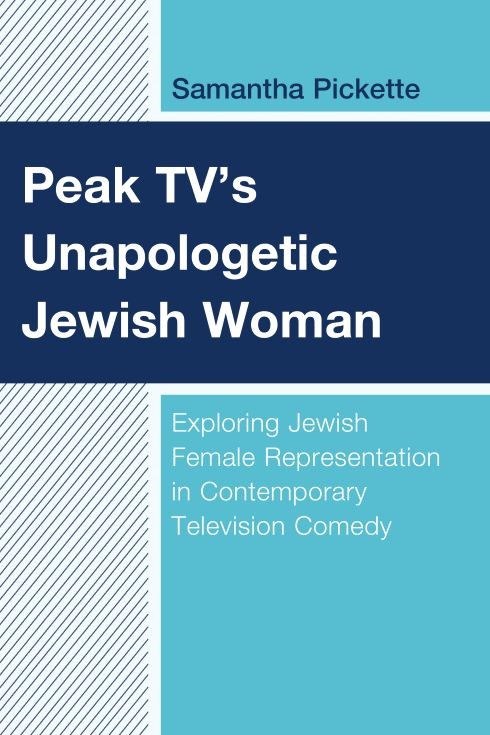Defining the Jewish Woman in an Era of "Peak TV"
March 3, 2023
By Samantha Pickette
Watch the 2023 HBI book launch for Dr. Samantha Pickette's Peak TV’s Unapologetic Jewish Woman: Exploring Jewish Female Representation in Contemporary Television Comedy.
When looking back at the history of Jewish women in television comedy, the sheer lack of Jewish female characters is striking, if not totally surprising considering American pop culture's complicated relationship with Jewish femininity. By comparison, contemporary TV comedy offers an embarrassment of riches, both in terms of the sheer number of series with Jewish female showrunners and in terms of the diversity of the Jewish female protagonists that appear on these series. How did we get from Molly Goldberg and Rhoda Morgenstern to Rebecca Bunch and Midge Maisel?
In this moment of Peak TV, it seems that the lucky combination of myriad platforms with seemingly unlimited content, more diversity on- and off-screen, an interest in "niche" storytelling, and ample opportunities for self-representation have led to a reframing of television's Jewish woman, one that emphasizes her humanity, interiority, well-roundedness, and, perhaps most strikingly, her clear and unapologetic connection to Jewish culture, outside the realms of stereotype or self-hatred.
For a long time, the gold standard of Jewish female representation on TV, and one of the few Jewish mother characters not meant to inspire fear, mockery, was Molly Goldberg from Gertrude Berg’s "The Goldbergs," and Rhoda Morgenstern — the unlucky female schlemiel who acts as the more relatable, less perfect ethnic foil on "The Mary Tyler Moore Show."
The idea of Rhoda, a Jewish woman, as the most relatable and human character on a sitcom was a novel one considering the archetypes of Jewish femininity that permeated popular culture during the network era; Rhoda stood out in a cultural landscape dominated by images of young Jewish women as superficial Jewish-American Princesses (JAPs) and undesirable Ugly Ducklings and older Jewish women as Sophie Portnoy-esque Jewish Mothers. Rhoda's characterization offered something new to the television landscape: a Jewish woman defined outside the realm of classical archetypes of Jewish femininity, rendered human and relatable because of, rather than in spite of, her personal, professional, and romantic struggles.
At the same time, however, Jewishness in both "The Mary Tyler Moore Show" and in its subsequent spinoff, "Rhoda," lacks overt cultural specificity — her Jewishness is not a religion or even an ethnicity, but rather a set of broadly-defined cultural stereotypes. Rhoda is "Jewish" because she has a New York accent, a sardonic wit, and darker hair and wider hips than the non-Jewish Mary.
 The juxtaposition between the novelty of Rhoda Morgenstern"s explicit Jewishness and the nebulousness of what that Jewishness actually communicated to audiences provides a case study that contextualizes the Jewish woman's role in television comedy during the network era (1950s–mid-1980s) and cable revolution (mid-1980s–early 2000s). Vincent Brook argues that during this time period, television programming was characterized by a "ghetto mentality" where producers "began adopting quotas for Jewish characters… they rationed you: one Jewish character a year." Even in the 1990s, which saw an exponential increase in the number of Jewish characters on television with 33 sitcoms with Jewish protagonists airing from 1989 to 2001, Judaism on television was, for the most part, stereotyped, trivialized, or whitewashed in an effort to appeal to mainstream audiences.
The juxtaposition between the novelty of Rhoda Morgenstern"s explicit Jewishness and the nebulousness of what that Jewishness actually communicated to audiences provides a case study that contextualizes the Jewish woman's role in television comedy during the network era (1950s–mid-1980s) and cable revolution (mid-1980s–early 2000s). Vincent Brook argues that during this time period, television programming was characterized by a "ghetto mentality" where producers "began adopting quotas for Jewish characters… they rationed you: one Jewish character a year." Even in the 1990s, which saw an exponential increase in the number of Jewish characters on television with 33 sitcoms with Jewish protagonists airing from 1989 to 2001, Judaism on television was, for the most part, stereotyped, trivialized, or whitewashed in an effort to appeal to mainstream audiences.
As a result, Jewish women, to an even further extent than their male counterparts, rarely appeared on prime-time network television — a fact made obvious by the nearly 20-year gap between Molly Goldberg's final appearance on "The Goldbergs" and the "Rhoda" premiere, and the subsequent 15-year gap between "Rhoda" finale in 1978 and the appearance of Fran Fine (Fran Drescher) on the 1993 premiere of CBS's "The Nanny," the next network sitcom to feature a Jewish female main character.
When they did appear, they often fulfilled stereotypical supporting roles — the hysterical Jewish Mothers on NBC's "Seinfeld" (1989-98) and "Mad About You" (1992-99), for example, who not only stood in the way of their nebbish sons’ happiness, but who were often compared unfavorably to those sons' non-Jewish partners — or, like Rhoda Morgenstern, were hyper-assimilated to the point where their Jewishness functioned as little more than a collection of undesirable behaviors — the neuroticism of Monica Geller from "Friends" (NBC, 1994-2004) and Grace Adler from "Will & Grace" (NBC, 1998-2006), the icy detachment of Lilith Sternin on "Cheers" (NBC, 1982-1993) and "Frasier" (NBC, 1993-2004), the superficiality and co-dependence of "Friends" Rachel Green, and the excessive anger and brashness of Susie Greene from "Curb Your Enthusiasm" (HBO, 2000-present).
The rare religious rituals shown further served to reinforce cultural stereotypes about "demanding" Jewish women: on "Sex and the City" (HBO, 1998-2004), for instance, PR maven Samantha Jones clashes with a 13-year-old "brat mitzvah beast," whose rich father is throwing her a $1 million bat mitzvah party; in a later season, the wealthy, prudish Charlotte York's conversion to Judaism is framed simply as a natural transition from her "Episcopalian princess" past to a Jewish Princess future.
The paradigm of Jewish femininity asserted by the series of the network era and cable revolution provides a singular image of the Jewish woman, one that revolves around Jewish difference, hyper-assimilation, a disconnect from religious observance, and an adherence to the Jewish Mother/JAP tropes that render her "too Jewish" even when other markers of Jewishness are absent. Even when she deviates from this paradigm—seen through Rhoda's schlemielization, or Fran's softening of the classic JAP, for instance — she ultimately upholds the conflation of Jewish female identity and the inability to act like a "normal" (i.e., non-Jewish) woman. Jewish femininity, therefore, is embarrassing, unsuitable, vulgar, excessive and comic in its inherent deviation from social convention.
 Contemporary Jewish television comedy, then, is characterized by a marked attempt to present Jewishness (and Jewish femaleness) as it is, rather than relying on Jewish tropes leftover from network-era sitcoms that emphasize Jewish difference, hyper-assimilation, and a disconnect from religious observance as hallmarks of a singular Jewish-American experience. As the Pew Research Center’s most recent survey of Jewish Americans suggests, American Jews are, as a whole, a "culturally engaged, increasingly diverse group" whose connection to Jewishness is mostly informed by cultural and ethnic practices rather than religiosity. Ultimately, even in an "awkward phase" of American-Jewish identity in which American Jews are figuring out what being Jewish means to them, often by establishing their own cultural, religious, ethnic and ancestral definitions across gender, generational, and denominational lines, the Pew data confirms that "Jewish identity matters" to the vast majority (~75%) of American Jews, and that Jewish engagement itself is becoming an individualized process.
Contemporary Jewish television comedy, then, is characterized by a marked attempt to present Jewishness (and Jewish femaleness) as it is, rather than relying on Jewish tropes leftover from network-era sitcoms that emphasize Jewish difference, hyper-assimilation, and a disconnect from religious observance as hallmarks of a singular Jewish-American experience. As the Pew Research Center’s most recent survey of Jewish Americans suggests, American Jews are, as a whole, a "culturally engaged, increasingly diverse group" whose connection to Jewishness is mostly informed by cultural and ethnic practices rather than religiosity. Ultimately, even in an "awkward phase" of American-Jewish identity in which American Jews are figuring out what being Jewish means to them, often by establishing their own cultural, religious, ethnic and ancestral definitions across gender, generational, and denominational lines, the Pew data confirms that "Jewish identity matters" to the vast majority (~75%) of American Jews, and that Jewish engagement itself is becoming an individualized process.
In the case of series like "Crazy Ex-Girlfriend" (CW, 2014-19) and "The Marvelous Mrs. Maisel" (Amazon Prime, 2017-present), these changes operate largely on generational lines; if CXG's self-named JAP Rebecca Bunch and "Maisel's" burgeoning stand-up comic/single mother Midge Maisel embody versions of Jewish femininity that rehabilitate conventional archetypes defining Jewish female behavior, their positive difference juxtaposes the "too Jewish" behavior of the parental generation, whose adherence to midcentury conceptions of Jewish otherness subsequently undermines Rebecca and Midge's relative progressivism. Series such as "Broad City" (Comedy Central, 2014-19) and "Difficult People" (Hulu, 2015-17) push the work of "Crazy Ex-Girlfriend" and "The Marvelous Mrs. Maisel" one step further, moving beyond classical Jewish stereotypes altogether and reframing Jewish femininity in general, and Jewish female precarity specifically, through the lens of the fun-loving, sex-positive, schlemielized, and proudly Jewish Unapologetic Jewess — an archetype that presents a GenX/Millennial approach to adulthood, womanhood, and Jewishness that emphasizes individual meaning-making, choice, and freedom from restrictive gender expectations. "Transparent" (Amazon Prime, 2014-19) and Grace and Frankie (Netflix, 2015-2022) both build on "Broad City" and "Difficult People's" positive reconception of the young Jewish woman by redefining Jewish motherhood through a gendered inversion of the Jewish family and of Jewish ritual itself.
In many ways, the images of Jewishness and Jewish femaleness disseminated in contemporary television comedy confirm the Pew Research Center's sociological sketch of American Jewry. While most Jewish female protagonists on mainstream comedies are not traditional or particularly observant, Jewish engagement — and, more specifically, imbuing Jewish holidays/religious festivals with individualized rituals that foster a personalized connection with Judaism — permeates Jewish television in the Peak TV era. "Transparent's" Pfefferman family holds an impromptu Passover Seder while on a cruise, with a makeshift Seder plate featuring saltines (matzah), wasabi (bitter herbs), and charoset made of nuts, raisins, and vinegar from the ship’s salad bar. "Broad City's" Abbi and Ilana sit shiva for Ilana’s grandmother, try (and fail) to go on a Birthright trip, make connections with a Holocaust survivor, and struggle to fast on Yom Kippur. Rebecca Bunch attends a family bar mitzvah. Grace and Frankie try to convince a rabbi to perform the interfaith marriage of their ex-husbands, Robert and Sol.
At the same time, even the least religiously inclined television Jews assert their Jewish identities through overt, intertextual references to secular Jewish culture. Rebecca Bunch peppers her conversations with Yiddishisms and Hebrew phrases, Jewish cultural signposts and self-deprecating Jewish humor. Billy and Julie attend Yiddish poetry readings, talk in detail about dybbuks, mock people who own a surplus of Judaica, and confront the hypocrisies of endemic antisemitism head-on; as Julie quips before a matinee of the musical Annie, "Isn't it funny how FDR is a total hero in this play even though in real life he let millions of Jews die?" Abbi and Ilana attempt to "retire" to South Florida after falling in love with Ilana's late grandmother's Jewish retirement community. Girls' Shoshanna attempts to lose her virginity to a man she first met at Camp Ramah. Holocaust remembrance and an ambivalence about Israel formulate major storylines on "Transparent" and "Broad City," while "Difficult People," "Crazy Ex-Girlfriend" and "The Sarah Silverman Program." Simply put, the Jews of contemporary television comedy represent the majority of American Jews as outlined by the Pew survey results: not religious, but engaged enough with Jewish tradition to seek out Jewish religious ritual when they find it meaningful; connected to Jewish identity through food, popular culture, literature, humor and a sense of shared ethnic heritage; aware of historical antisemitism yet unafraid to share their Jewishness with others.
The Jewish women featured in contemporary TV comedy share little in common with their historical counterparts, but they also share little in common with each other. The most significant change offered by the female-driven comedy series of the past decade, then, is a diversification of television’s Jewish woman that eschews the idea of a singular model of Jewish female identity in favor of a varied spectrum of character traits, backgrounds, family dynamics, and relationships with Jewishness and Judaism. The common threads that tie these post-network Jewish women to each other — a positively framed unruliness that emphasizes subjectivity and originality, an unapologetic connection to Jewishness/Judaism unobscured by coding or self-consciousness, outward-facing humor rooted in action rather than in self-deprecation, open sexuality, and a defiance of gender norms — ultimately come together to serve two important functions.
First, they undermine historical representations of Jewish femininity, complicating and, in many cases, bypassing altogether the Jewish Mother/JAP cul-de-sac of Jewish female representation in order to establish new tropes. Secondly, and perhaps more importantly, they humanize the Jewish woman by individualizing her. This reconception of the Jewish woman as representing only herself allows for more complex, nuanced representation that leaves room for character flaws, comic mishaps, and precarious choices without communicating blanket messages about what "all Jewish women" are like.
In this "Peak TV" moment, when television is meant to reflect life back at the audience, it stands to reason that television representations of Jewish women should get more and more diverse and nuanced to reflect the landscape of how actual Jews (and actual Jewish women) experience Judaism; the mechanics of the television industry have opened the door for more representation, and that increased representation indicates a desire on the part of Jewish content creators to move beyond classical popular culture tropes of Jewishness — hyper-assimilation, coded Jewishness, stereotypes, cultural whitewashing — and towards a less self-conscious, more complicated, and "culturally narcissistic" version of Jewish representation that engages more meaningfully with Jewish culture in many forms.
The progress made in the past decade towards reframing the Jewish woman on television suggests further variegation in the decades to come, and with that, perhaps the addition of even more multi-layered, socially conscious, and female-driven storytelling that will continue to hone contemporary Jewish comedy and broaden the scope of the television medium by revealing a myriad of Jewish female characters representing an abundance of Jewish femininities.
 Samantha Pickette is an assistant professor of Jewish studies, and the assistant director of the Schusterman Center for Jewish studies at the University of Texas at Austin. She is the former HBI Gilda Slifka Summer Internship academic adviser.
Samantha Pickette is an assistant professor of Jewish studies, and the assistant director of the Schusterman Center for Jewish studies at the University of Texas at Austin. She is the former HBI Gilda Slifka Summer Internship academic adviser.